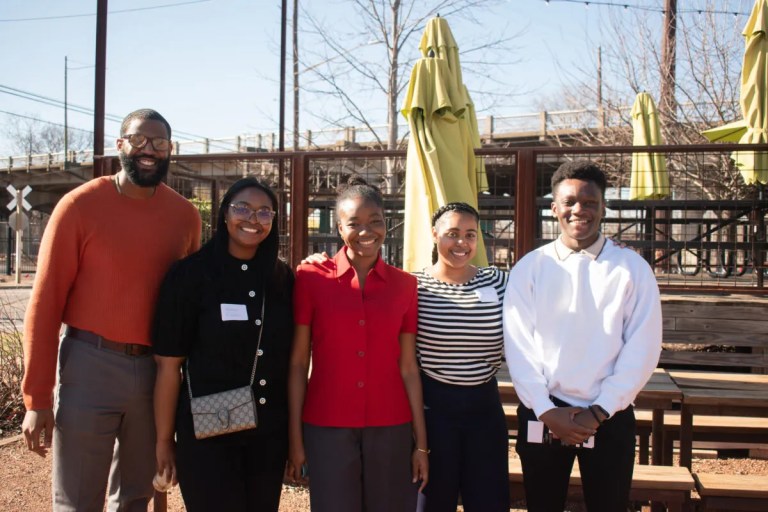Reviewed by: Sharron Swain
How local families are celebrating Rosh Hashanah, the Jewish New Year
Reading time: 4 minutes

Jewish New Year, known as Rosh Hashanah, marks the first of the Jewish High Holidays and represents a fresh start.
So, what does this mean? We spoke to Rabbi Henkin with Temple Beth-El, Miriam Friedman with Chabad of Alabama and Barbara Aland with Temple Emanu-El about their perspectives on this time of year and how they honor it. Keep reading to see what we learned.
Rabbi Henkin appreciates the variety of Rosh Hashanah traditions

Rabbi Henkin with Temple Beth-El gave examples of the symbolic foods and other traditions and how this allows the holiday to be more interactive, aside from the typical services at synagogue.
Some of these foods that Rabbi Henkin mentioned include:
- Apples dipped in honey: represents the hope for a sweet new year
- Challah: often baked in a round shape on Rosh Hashanah to signify cyclical nature of time in the new year
- Fish head: symbolizes starting the year on the right track, “be the head and not the tail”
- Pomegranate: said to contain 613 seeds, which corresponds to the 613 commandments of the Torah
“The good thing about these kinds of traditions is it allows everybody to connect in different ways.
We have meditation for those entering services, philosophy and theology for those who want to contemplate that during services and then hands-on things for those who want to engage rather than just sit in services.
It’s a good way to get everybody involved in different ways. We’ll all be able to connect with God and our tradition in the spirit in a way that feels meaningful and important.”
Rabbi Henkin, Temple Beth-El
The Shofar, which is typically blown a total of 100 times during a Rosh Hashanah service, serves as a spiritual alarm clock, as Rabbi Henkin likes to call it.
“The Shofar is supposed to wake us up and help us recognize that we’ve been spiritually sleepwalking through our lives. It calls us to live a more full life.”
Rabbi Henkin, Temple Beth-El
10 days of reflection between Rosh Hashanah + Yom Kippur
Yom Kippur comes 10 days after Rosh Hashanah. Rabbi Henkin explained the difference between these two High Holidays and the 10-day period known as the “Days of Awe.”
“Rosh Hashanah is supposed to help us start the process of looking inward at our lives and looking at the people we are and the people we want to be. Yom Kippur gives us a chance to take off the spiritual work that we need to do to become those people.”
Rabbi Henkin, Temple Beth-El
Miriam Friedman sees Rosh Hashanah as a chance to reflect on who she is

While speaking to Miriam Friedman about the traditions that her family has kept over the years, she kept circling back to one point: this time of year is a chance to reconnect with who you are.
“I would say that Rosh Hashanah for me is an opportunity to reflect on the year that has passed and the year that is coming. I can reflect on my relationship with God and how I can make that stronger and get back to the core of who I am.
It gives me an opportunity to recalibrate myself and get back to that place.”
Miriam Friedman, Chabad of Alabama, Director of JAHM Chai Tots Preschool
In the days leading up to Jewish New Year, Miriam’s family traditionally reads the 150 passages of Psalms to center themselves as they await Rosh Hashanah.
Barbara Aland loves to celebrate the New Year with friends + family

Jewish holidays begin in the evening, so many Jews begin Rosh Hashanah with a festive family dinner before attending services at a synagogue that night and again the following day.
Barbara Aland spoke on how she had to navigate keeping these dinners a tradition through a growing household.
“Times have changed a little bit and I realized it was a lot of pressure to try to have dinner and then go to services immediately. A while ago, I started doing the big meal after services on the day of Rosh Hashanah.”
Barbara Aland, Executive committee, Temple Emanu-El
Part of this big dinner that Barbara is referring to includes beautiful flowers on the table, a delicious kugel, beef brisket and raisin challah for something sweet.
These families and the synagogues they belong to are proof of Birmingham’s diverse and beautiful culture. It’s hard not to love the people of The Magic City.
Don’t miss updates like this from our community—sign up for our FREE Bham Now newsletter.



